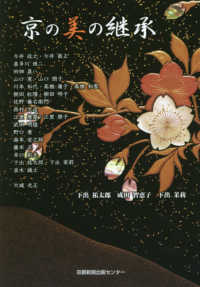- ホーム
- > 洋書
- > 英文書
- > Politics / International Relations
Full Description
In writing about international affairs in the 1960s, historians have naturally focused on the Cold War. The decade featured perilous confrontations between the United States and the Soviet Union over Berlin and Cuba, the massive buildup of nuclear stockpiles, the escalation of war in Vietnam, and bitter East-West rivalry throughout the developing world.
Only in recent years have scholars begun to realize that there is another history of international affairs in the 1960s. As the world historical force of globalization has quickened and deepened, historians have begun to see that many of the global challenges that we face today - inequality, terrorism, demographic instability, energy dependence, epidemic disease, massive increases in trade and monetary flows, to name just a few examples - asserted themselves powerfully during the decade.
The administration of President Lyndon B. Johnson confronted tectonic shifts in the international environment and perhaps even the beginning of the post-Cold War world. While the ideologically infused struggle between the United States and the Soviet Union was indisputably crucial, new forces and new actors altered international relations in profound and lasting ways.
This book asks how the Johnson administration responded to this changing landscape. To what extent did U.S. leaders understand the changes that we can now see clearly with the benefit of hindsight? How did they prioritize these issues alongside the geostrategic concerns that dominated their daily agendas and the headlines of the day? How successfully did Americans grapple with these long-range problems, with what implications for the future? What lessons lie in the efforts of Johnson and his aides to cope with a new and inchoate agenda of problems?
This book reconsiders the 1960s and suggests a new research agenda predicated on the idea that the Cold War was not the only - or perhaps even the most important - feature of international life in the period after World War II.
Contents
Acknowledgments ; Contributors ; Introduction, Francis J. Gavin and Mark Atwood Lawrence ; Part I: Thinking Beyond East and West ; 1. Lyndon Johnson and the Challenges of Economic Globalization, Daniel Sargent ; 2. Toward a New Deal for the World? Lyndon Johnson's Aspirations to Renew the Twentieth Century's Pax Americana, Patrick O. Cohrs ; 3. Moving Beyond the Cold War: The Johnson Administration, Bridge-Building, and Detente, Thomas A. Schwartz ; Part II: Internationalizing the Great Society ; 4. One Global War on Poverty: The Johnson Administration Fights Poverty at Home and Abroad, 1964-1968, Sheyda Jahanbani ; 5. LBJ's Third War: The War on Hunger, Nick Cullather ; 6. LBJ and World Population: Planning the Greater Society One Family at a Time, Matthew Connelly ; 7. Globalizing the Great Society: Lyndon Johnson and the Pursuit of Smallpox Eradication, Erez Manela ; Part III: Adapting to a World of Scarcity ; 8. Thinking Globally: U.S. Foreign Aid, Paul Ehrlich, and the Emergence of Environmentalism in the 1960s, Tom Robertson ; 9. "More a Gun at Our Heads than Theirs": The 1967 Arab Oil Embargo, Third World Raw Materials Sovereignty, and American Diplomacy, Christopher R.W. Dietrich ; Part IV: Shifting Moralities ; 10. The Rise of Human Rights during the Johnson Years, Sarah B. Snyder ; 11. Globalized Faith, Radicalized Religion, and the Domestic Sources of U.S. Foreign Policy, Andrew Preston








